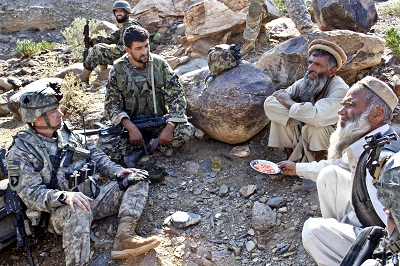Progress and Challenges in Afghanistan and Pakistan
A USIP Congressional Newsmaker Series Event
Please join us for a special event featuring Senator Jeanne Shaheen (D-NH), who will discuss her August 2011 trip to Afghanistan and Pakistan. As a member of both the Senate Foreign Relations Committee and the Senate Armed Services Committee, Senator Shaheen will offer a unique congressional perspective on diplomatic and security conditions in Afghanistan and Pakistan, as well as insights on the policy challenges facing the United States.
Please join us for a special event featuring Senator Jeanne Shaheen (D-NH), who will discuss her August trip to Afghanistan and Pakistan where she traveled with Sens. Carl Levin (D-MI) and Jeff Merkley (D-OR). The congressional delegation met with U.S. troops and commanders and senior U.S., Afghan, and Pakistani leaders, including Afghan President Hamid Karzai and Pakistani President Asif Ali Zardari. As a member of both the Senate Foreign Relations Committee and the Senate Armed Services Committee, Senator Shaheen will offer a unique Congressional perspective on diplomatic and security conditions in Afghanistan and Pakistan, as well as insights on the policy challenges facing the United States. A Q+A session will follow Sen. Shaheen's remarks.

The U.S. Institute of Peace has worked to promote peace and stability in Afghanistan and Pakistan for several years. Since 2002, USIP's work in Afghanistan has focused on peaceful dispute resolution at the grassroots level, enhancing dialogue between Afghan leadership and the international community, and promoting Afghan rule of law. The Institute's field office in Kabul strengthens USIP's capacity to execute effective and innovative programs in the country. In Pakistan, USIP's projects have focused on improving mutual understanding between the U.S. and Pakistan, strengthening capacity to mitigate conflict, and promoting peacebuilding through education and civil society initiatives.
This event is part of USIP's Congressional Newsmaker Series. Previous speakers in the series include Rep. Charles Boustany, Sen. Mark Kirk, and Rep. Jim McGovern.
Speakers:
- Richard H. Solomon, Opening Remarks
President, U.S. Institute of Peace - Senator Jeanne Shaheen, Prepared Remarks
- Andrew Wilder, Moderated Discussion
Director, Afghanistan and Pakistan Programs
U.S. Institute of Peace
Explore Further
- Learn more about Sen. Shaheen's trip to Afghanistan and Pakistan
- Learn more about USIP's work in Afghanistan and Pakistan
*Photo Caption: U.S. Army 2nd Lt. Daniel Wild (left) and an Afghan army weapons team leader (2nd from left) talk with Gurem village elders in Nangarhar province, Afghanistan, on Nov. 6, 2010. Wild is assigned to 1st Squadron, 61st Cavalry Regiment. (Courtesy: DoD photo by Staff)



